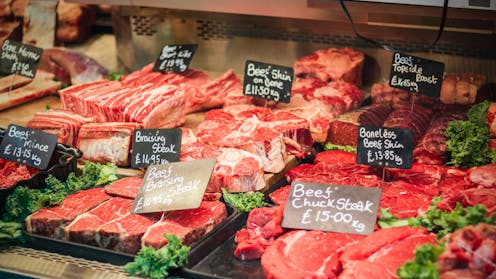Cheaper food or a compromise on standards? Why the UK’s trade deal with the US is sounding alarm bells
- Written by Manoj Dora, Professor in Sustainable Production and Consumption, Anglia Ruskin University

British farmers[1] and food safety campaigners[2] have been sounding the alarm over the recent deal struck between the UK and US. The agreement[3] offers unprecedented access to US agricultural exports such as beef and ethanol into the UK market.
While some hailed this[4] as a breakthrough[5] after previous talks stagnated under Joe Biden’s administration, critics argue[6] it could undercut domestic producers, introduce lower standards for food and even compromise public health[7]. With the cost of living remaining high, cheaper US imports may look appealing to British consumers. But many fear the products may come at a longer-term cost.
The UK government has insisted[8] it will not compromise on standards. Hormone-treated beef and chlorine-washed chicken remain banned. But critics are sceptical[9]. At the White House, US trade officials suggested food rules should be based on science[10], hinting at renewed pressure to permit products currently excluded by UK law.
But public opinion in the UK strongly supports high food standards. Surveys show most UK consumers[11] reject hormone-fed beef and chlorinated chicken, valuing animal welfare and food safety. Given this, any shift toward US-style practices could trigger a backlash.
But cheaper imports could ease grocery bills in the UK, a welcome prospect given food price inflation peaked at more than 19% in 2023[22]. Cheaper beef might help households increase their protein intake. For lower-income families, for example, small savings on staples could really improve nutrition.
However, not all cheap calories[23] are healthy. Britons are already encouraged to eat less red meat[24] on health grounds. Increased access to cheaper beef could nudge intakes beyond recommended levels.
Restaurateur Henry Dimbleby, the UK government’s former food strategy lead, has argued that undermining domestic standards[25] for short-term savings risks health and environmental setbacks.
Food safety is another issue. While the government says all imports will meet UK standards, future trade negotiations could challenge that. Country-of-origin labelling and enforcement will be essential for consumer confidence.
There’s also the risk of more ultra-processed food[26] entering the UK. The deal may increase imports of US cereals, drinks and snack foods. While not inherently unsafe, many health advocates worry about worsening rates of obesity and diabetes if heavily processed products become cheaper and more common in the UK.
Trade can bring benefits — but food isn’t just another commodity. It intersects with health, environment and rural life. The NFU warns that Britain’s high standards shouldn’t be quietly traded away under pressure from US agribusiness.
The UK government claims it has preserved food protections while expanding trade. What will be key is whether consumers see real savings, as well as whether supermarkets stick to British meat. If not, it remains to be seen whether UK farmers can compete or if they will be squeezed out.
Crucially, UK regulators must hold the line if the US pushes harder. A prosperous deal should not just mean more trade — but safer, healthier and fairer food for all.
References
- ^ British farmers (www.theguardian.com)
- ^ food safety campaigners (www.agriculture.com)
- ^ The agreement (theconversation.com)
- ^ hailed this (www.britishchambers.org.uk)
- ^ breakthrough (www.whitehouse.gov)
- ^ critics argue (www.pig-world.co.uk)
- ^ compromise public health (www.nature.com)
- ^ has insisted (www.gov.uk)
- ^ critics are sceptical (www.standard.co.uk)
- ^ based on science (www.dtnpf.com)
- ^ most UK consumers (phys.org)
- ^ Sign up to our daily newsletter (theconversation.com)
- ^ “enhance agricultural market access” (www.gov.uk)
- ^ 13,000 tonnes (www.bbc.co.uk)
- ^ improved US market access (www.farminguk.com)
- ^ Feedlot beef (www.thetimes.com)
- ^ a “disaster” (www.farmersguardian.com)
- ^ Supermarkets (www.standard.co.uk)
- ^ wholesale and catering (www.farmersguardian.com)
- ^ destabilise farm incomes (www.nfuonline.com)
- ^ Steve Travelguide/Shutterstock (www.shutterstock.com)
- ^ 19% in 2023 (www.theguardian.com)
- ^ cheap calories (foodishealth.substack.com)
- ^ less red meat (www.bowelcanceruk.org.uk)
- ^ undermining domestic standards (www.theguardian.com)
- ^ ultra-processed food (theconversation.com)







